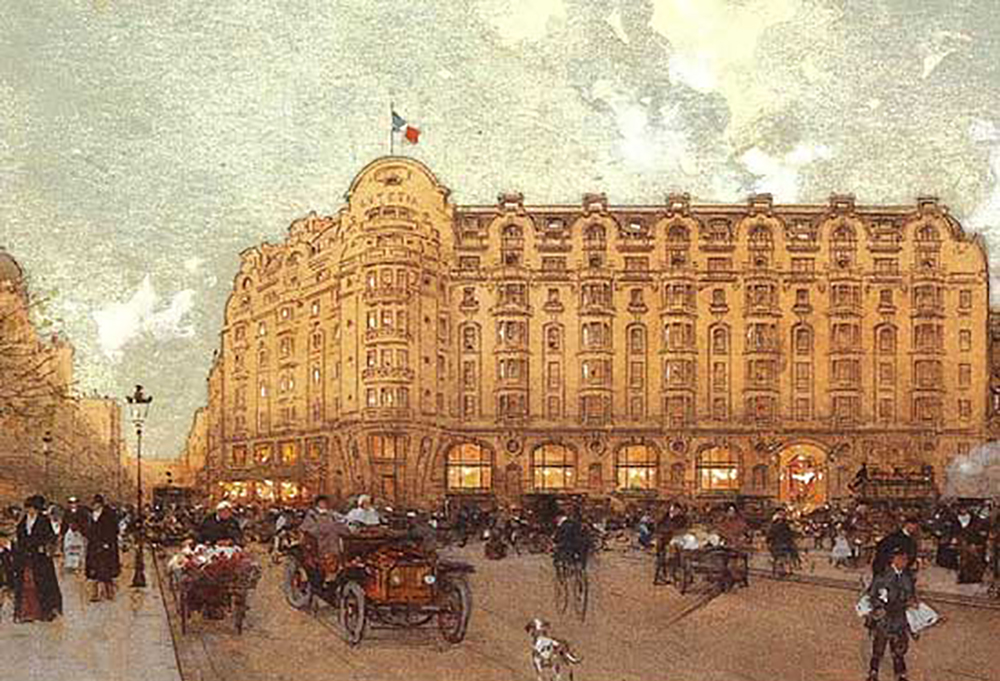Arrival in Paris
We arrived at the Gare du Nord towards the end of 1929.
My father, my sister Anna and my brother Serge are waiting for us. My father was suffering from a stomach ulcer, and my sister had to look after him. Hugs, reunions, we take a taxi to our new home. We take the Boulevard Magenta, the Place de la République and the Place de la Bastille, all names that ring out with freedom.
Our flat was on the corner of rue de Turenne and rue St Antoine.It was a hotel for immigrants. We had 2 bedrooms on the 7th floor, one for the grown-ups, Serge and Anna, and my brother David and I slept with our parents in the room opposite.
Our first contact in France
On the same landing, there was a young man, a tailor by trade, quite handsome, Jewish like us. My mother, like any Jewish mother, often invited him to share our meals. He loved broth, chicken, minced meatballs, etc....
It was Bernard Pollak. In the early days, my sister Anna often worked for him finishing jackets. As he had already been in Paris for a year, he knew a few words of French and helped us to integrate. My sister (a girl who was intelligent, well-educated, courageous, enterprising and, what's more, good-natured) fell in love with him, and of course what had to happen, happened...
They often went for walks, along the rue St Antoine, the rue de Rivoli, the Concorde, the Champs Elysées...
David and I used to follow them, hiding behind the pillars in the rue de Rivoli. Once we lost sight of them, we turned around to go home, and a policeman, intrigued by what we were doing and seeing two children in navy blue overcoats, velvet collars and patent leather shoes, asked us something in French which I didn't quite understand. So, feeling protective of my brother, I showed him the address of our hotel. Seeing that we were not going in the right direction, he accompanied us for a while and put us on the right track.
Anna and Bernard later married, and for the wedding, I got my first suit, made to measure by a small tailor in the rue des Rosiers.
Pictures of Rue de Rosier from the Internet
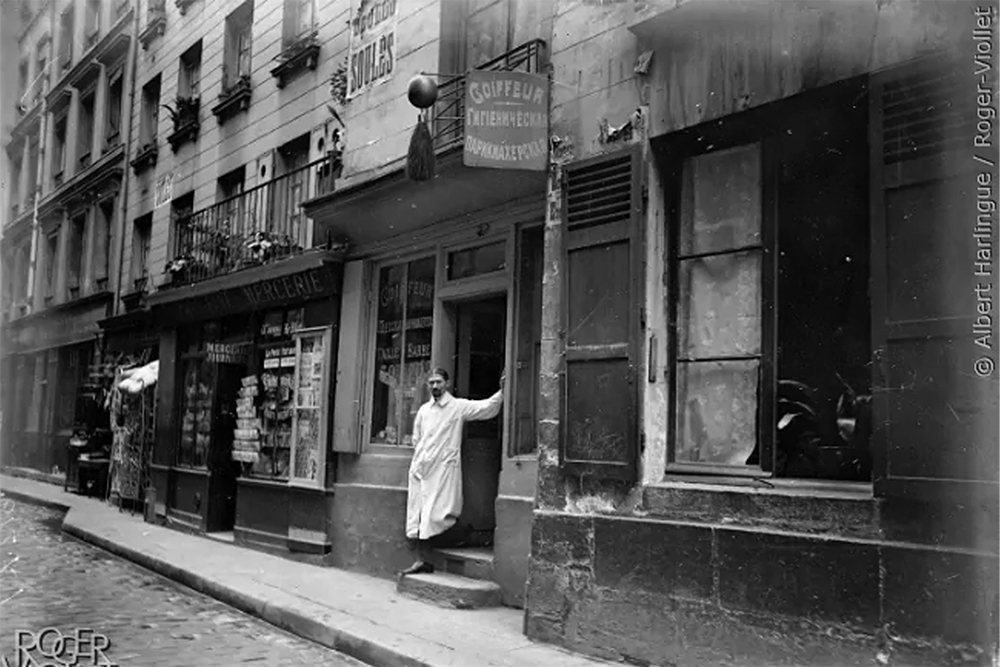 |
|
 |
You have to work hard!
My father had never been a manual worker, but always a good manager. In Poland, he never worked as a labourer, although his partners were all very good workers, and he was now looking for this rare bird. When asked why a partner, he replied: A partner never looks at his watch. He works until the job is done. So he set out to find this man, with the idea of setting up a trouser-making workshop, with the help of a great tailor of the day .... Mr Liberman.
At the Liberman family home
The Libermanns were connected to my mothers' family. He once invited us to lunch on Rue du Pasteur Lagner. After dinner, my brother David and I were given copper coins to go to the cinema. Our first cinema in Paris. At the Saint Sabin cinema they played in a silent film by Charlie Chaplin. In the interval there was a magician. We attended this performance, still dressed in our navy overcoat with the velvet collar, and our patent leather shoes, an episode in our life that is still fresh in our minds today.
The Project
My parents' aim originally was to move to London, using Paris as a springboard. My mother had a large family who had lived in London for a long time. They had a cigarette box factory. (Gabriel and Coleman Smith) My parents arrived in England during the period of the smog, the legendary English fog. My mother said: I would never bring my children here. They visited the English family named Smith, derived from Zmidek *. This very kind family opened an account for my parents at Barclay's Bank in Paris, to help us get started again, but this time with a new life.
At the Café aux Fourreurs
The Café aux Fourreurs, on the corner of rue du Faubourg Poissonnière and rue d'Enghien, was in fact the haunt of the neighbourhood's furriers. Back then, much more than now, the districts of Paris were divided into distinct neighbourhoods, and my father was told that in this café he could meet up with emigrants looking for work.
| Café aux Fourreurs.... today |
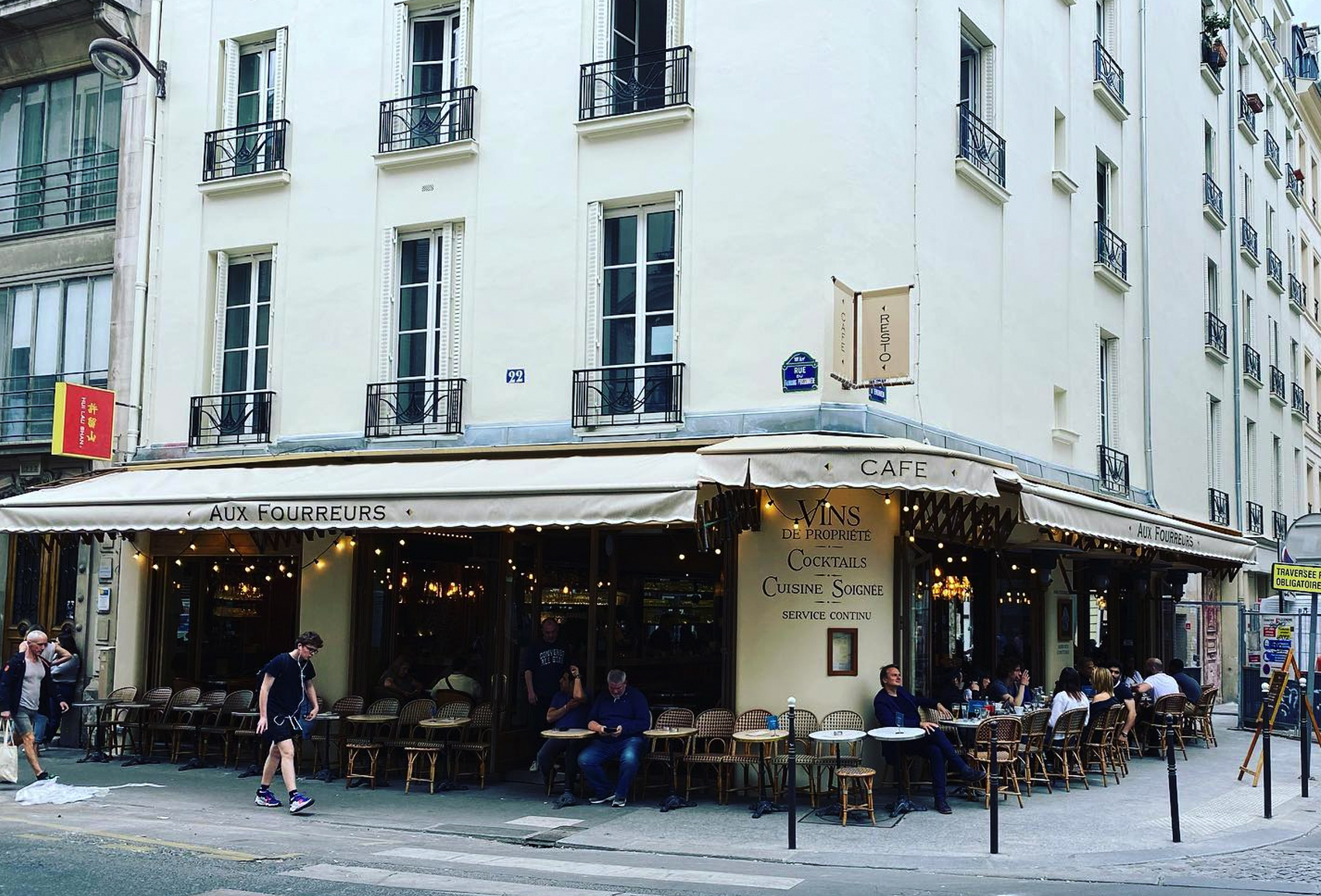 |
Among others, he met a man called Pavich Bathner, a specialist in making fur from astrakhan pieces. He was originally from the village o Zûlkew, near Lemberg, in the Galicia region of Poland, a place where almost everyone worked on this speciality, which at that time were sewn by hand. Remember, my father was always looking for a good workman to join him as a partner! At the time, very few emigrants could read or write, apart from Yiddish, but they were nonetheless scholars.
The start of a career in fur
To begin with, my father bought fur waste from specialist fur merchants. The work began in the hotel rooms we occupied.
|
||||
.jpg) |
.jpg) |
The cutter worked in silence, and had no time limit. He worked as much as he wanted, whereas the fur mechanic rarely went beyond 10 o'clock in the evening. It often happened that the couple, cutter/mechanic thus formed, became a real couple, and many marriages followed.
Life at work
In the early days, despite living and working in the hotel, my mother, being a good Jewish mother, often cooked for all the newly arrived workers on a small alcohol 'primus' stove. To feed all these people, supplies were delivered directly to the covered market, which was not far away. I often went with her at 5 o'clock in the morning and we bought food at the best price possible, even some slightly damaged bits unfit for sale, but by removing a small part of a tomato, for example, and cutting them up, nobody would notice, and the taste was the same, but the cost was a lot lower.
We lacked nothing. My sister Anna worked with Bernard, my mother sorted and classified the furs and did all the housework. My brother Serge was employed by Liberman as a shop assistant, an episode in his life that marked him for a long time, because Liberman had a daughter Rachel.
My father's business was progressing rapidly, with the help of the English family's loan through Barclays Bank. He decided to expand, and rented a villa in Créteil, on Rue Chèret, (~ 14km from the centre of Paris) because for any property he found in Paris, he was asked to take on a lease. Above all, my father wanted to bring everything together under one roof: the manufacture of trousers, the manufacture of astrakhan napkins, accommodation for the workers, our home, a flat for the Bathner partner, who brought his wife and children from Poland, and later his brother Bechet, and another, Léon. |
In short we formed a real community, Kibbutz style, before its time. All these people, housed and fed by my mother, as only a Jewish mother can do.
Bernard and Anna worked together on their garments, and Bernard occasionally took a look at the trouser workshop. Bernard was now part of the family.
School in Créteil
I remember that with my brother David, the first teacher we had at school in Créteil went to a lot of trouble to try and bring us up to standard. We were already good at arithmetic. He gave us private lessons after school, especially in French history, and I learnt that my first ancestors were the Gauls.
The day begins with a lesson on morals. Among other things, the teacher explained to us that we should treat our classmates well, not call our Italian classmates 'macaroni' or Jews 'kikes'.
Some children, unfortunately not all, remembered this foundation for tolerance. And for David and me, we did not like to fight at school, because the pupils were all very nice.
Of course, before class, hands and ears must be inspected, spitting on the floor was forbidden, etc. To make it easier for us to follow the lessons, the teacher gave us books in German to translate into French, because of our Yiddish. My brother David and I were in the same class, so I could always look after him, which made me happy and gave me a certain importance. Serge worked in Paris, so we didn't see much of him.
One day, some of the boys' mothers from our school came to complain to the headmaster that we were fighting with their children. At first, we didn't understand what these boys were saying to us, and we thought they were insulting us, and we as always we defended ourselves, as we did in Poland. In fact, we fought for nothing! The teacher took us aside and explained in German that we were not in Poland.
Scouting and the time of friends
School was over for me, and the work had began. David was left to his own devices, and was co-opted by Armand Lipchitz into the Scouts. Armand was a joiner on rue Vieille du Temple, opposite rue des Rosiers. His parents, who had emigrated from Russia, were a well-known family in the neighbourhood, especially for the help they gave to the people around them, particularly the immigrants. They helped them to settle in, asking in return to pay only what they could. The trestles and our nail boards come from their workshop. Armand was a scoutmaster with the Trumpeldor troops, the Beavers. A furry term, a premonition? David, the "wriggling eel", becomes patrol leader. Léon Lipchitz, Armand's brother,was the sous-chef. The troop included Sedlet, Motel, Petit Gros, Franco and Louisou. The patrol called itself "The Bats".
They were all proud of their uniforms. Nice sticks, blue and white scarves, khaki shirt, navy blue shorts, badge on top of shirt. I joined them later, after their national competition within the "E.I.F" (Eclaireurs Israélites de France), where they were ranked first; this consisted of lighting a fire and boiling a bowl of water. I was accepted into the Scouts at a ceremony in front of a bonfire, in accordance with the ritual established by Baden Powel. I was given the 'Wild Boar' totem. And symbolically, I received the necessary equipment, camping tent, canteen and sleeping bag. In scouting, moral lessons were all very well, but they didn't pay off when it came to buying the coveted uniform, stick, scarf, shirt, trousers, etc., so we had to do a variety of lucrative activities. Carrying luggage at the station on busy days, selling postcards, opening car doors in front of theatres in the evening, all to raise money fast enough to buy the necessary equipment. We often visited the Samaritaine department stores - you could find everything there - and there was a specialised section for Scouting. |
Badge of the EIF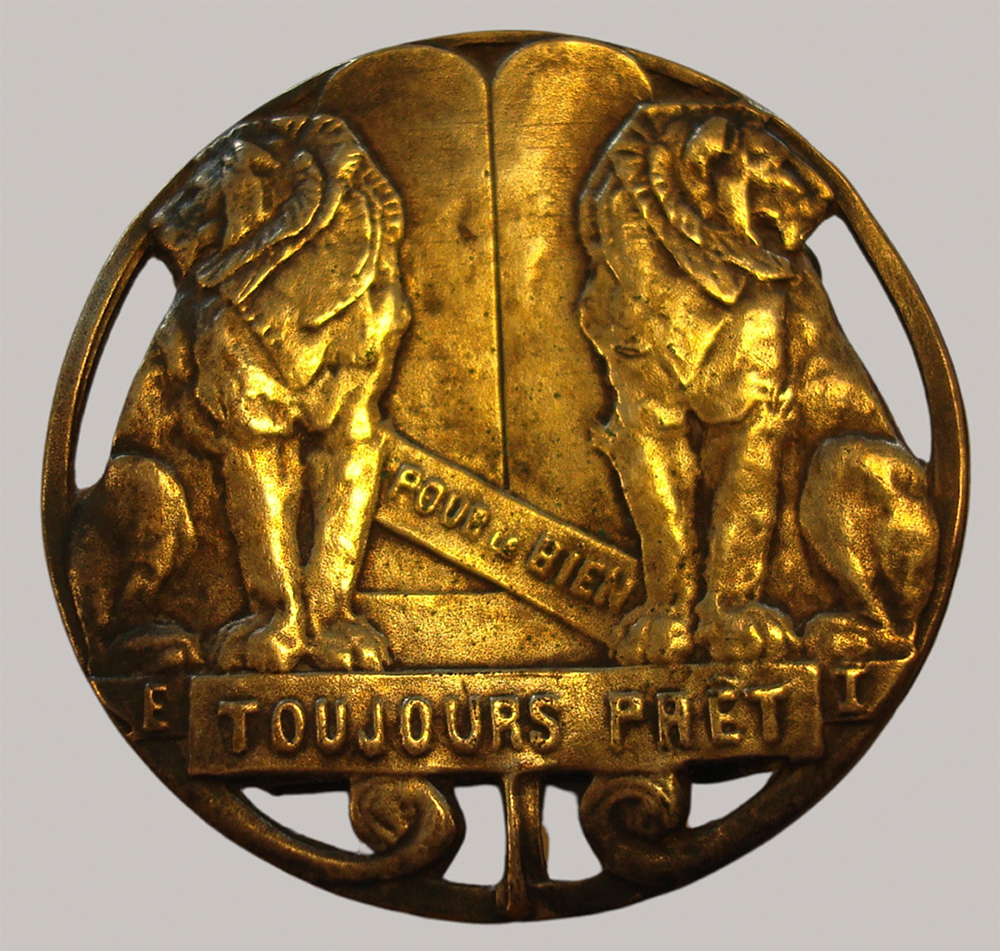 |
| Often the stand was manned by a Scout leader, who gave us good advice on what to buy and showed us the "Metsiés", the deals to be made. Sometimes we often forgot to go to the checkout once the parcel was done... but forgetting is not a crime .... | |
Street games
With the boys from the rue des Rosiers, we organised various games, such as the battle of the cauliflower trunks, one against the other. On one side were my friends, and on the other my little brother David and me. We protected ourselves with shields made from bin lids. Once, I was waiting for my brother to come out of school, still on "that mission", and we were attacked by surprise by a gang led by Makar, the only real Pole. He passed himself off as a Jew. They were waiting for us, hiding under a porch. A fight broke out, and we ended up at the local police station. My mother freed us and said to me: 'If you want to go back to Poland, keep it up. Or stop attracting attention to yourselves.'
Another game was the skate race. The only essential rule (since there was no other) was that the machine had to be made by ourselves. That was our greatest asset. Our Scout leader, Armand Liphcitz was a carpenter. The race started in the rue des Rosiers, then headed towards the rue de Rivoli.
The Place des Vosges
I can't talk about my youth without telling you about the Place des Vosges, a period of adolescence, flirting and meeting friends after work. Bulawko, our contact for free cinema, had a collection of all colours of exit cards for the interval, especially for the 'Bataclan' cinema with the complicity of an usherette who was part of the Place des Vosges gang.
We also went camping on the banks of the Marne, at Noisy le Grand. The camp was organised by the Fédération Sportive Générale du Travail ( F.S.G.T.). My life was running smoothly and without a care in the world.
Sport
My brother Serge was a member of J.A.S.C (Juif et Athlète en France). It was thanks to him that I joined the club in the boxing section with him. After a few weeks' training, I had my first fight in front of an audience of F.S.G.T. workers. Three two-minute rounds. The first match, the first defeat. But the most important thing is to take part," said "Coubertin". My brother Serge, heavier than me and better trained, was the star player. What a time! Tuesday: boxing training. Thursdays: swimming pool. Sunday: basketball match. In the meantime, all participants in scouting were required to attend an evening course outside work. David chose accountancy, Motel and me, drawing lessons.
With the Bat patrol, we went camping during Passover, as usual with very little food in reserve. Another E.I.D.F. troop also camped in the grounds of Baroness Alphen's château in Chantilly. After eating nettles as spinach, collecting food for the pheasants we got to know the other troop, and thanks to our budding friendship, we proposed to pool our resources and have dinner together, which we did. That evening we ate our fill, needless to say there wasn't much left, hungry as we were.
The next day, Sunday morning, we walked and hitchhiked to Paris, because there was a boxing match, J.A.S.C sport club against STERN, in six matches. I was scheduled for one match, and the event was taking place at my club on rue d'Angoulême, now rue Jean Pierre Timbault, and in the same courtyard there was a dressmaking shop run by a certain Mr Brutman.
Practically undernourished, I stepped into the ring to face an opponent much bigger than me. I heard the gong ring, and immediately after the first blows, I didn't know where I was! A round to his advantage.
After giving me a bit of air in my trousers and rubbing the magic sponge over my face, my ears were ringing and, above all, I didn't know where I was any more. I can't tell you what happened next, I can't remember a thing!
My friend Maurice, who had started boxing as a "pro", won by a knockout and was carried in triumph on the shoulders of the Yakist supporters. My brother Serge won the match in three rounds. What an evening, it was my last boxing match. For me, David and the E.I.F friends, we decided to stop this sport, which was too violent, but which had given me a lot because of the thorough training.
Les Gamins de Paris
Often on Saturday afternoons, David, Motel and I would go to rue Vieille du Temple, to the café of the L.I.C.A, "ligue internationale contre l'antisémitisme", "les Gamins de Paris". There we'd look for the "pigeon" (a person easy to win off ) and play a game of cards. With the money we made, we could go to the Grande Roue, a dance hall in Montmartre.
Rue de l'Echiquier
In 1936, we moved to 18 rue de l'Echiquier. We're expanding, it's a new twist in our lives. For me, new acquaintances, the neighbours on the first floor, a family whose name escapes me, emigrants from Germany.
They had a daughter who would later become the wife of Léon Sprung, the furrier. We rented a flat on the same floor to extend our workshop, and we were able to take on new staff, including a man who was a nailer, Henri Zilberman, the brother of Olga, who became Serge's wife. A little higher up, on the 3rd floor, there was a women's tailor, and there were three girls, one of whom was my age, Liza, and another sister.
Through the window, opposite my workbench, I could see a garment factory where beautiful girls were working. There were some really beautiful girls, and I used to meet with one of them for lunch at the café next door.
Flirtatious Sunday outings to the countryside didn't last long, as the staff in this garment factory changed frequently. During the off-season, at lunchtime, at the café in the rue d'Hauteville, we used to play a game of cards to kill time.
Free-loading during work
I was often sent on errands, and as luck would have it, I found myself in a theatre in the afternoon, at the Châtelet, where I saw Le Pays du Sourire, Carmen, Les Deux Orphelines, or at the Théâtre de la Gaieté Lyrique. The system for getting in was to go through with a group of people; once I'd passed the checkpoint, I settled down in the "chicken coop" **.
My father and export business We sent the goods out, but they were blocked by the Germans. Our client, a Jew like us, told my father that if he went to Germany to claim the goods from the authorities, he would be caught and interned. Luckily he didn't risk the journey. In short, a total loss. We have never seen a penny of this stolen merchandise. We had to start all over again. To make our work easier, cardboard knives with razor blades were invented. The cardboard folded, and we were better able to cut the furs. The cutting templates were made of zinc to make them last longer. Our worker Matz sewed them for us, and he was a very fast worker. |
January 1936 - Szmul visits the UK (the Smith family ?) |
Assimilation through study
My sister passed her school-leaving certificate because she was taking evening classes. My father had private lessons with a home teacher. Hard work.
Family happenings
Anna and Bernard, married and set up their own businesses in the fur trade.
Now the great emigration began. Herman (Bruttman), my mother's younger brother, stayed with us for a while to see what life was like in France. He worked various jobs, such as a waiter, furrier, and so on. He returned to Warsaw to bring his wife and children back. We never saw him again.
Before leaving, he helped my mother marry their younger sister Gisèle (Guitalé) to a good man, a Hungarian, Mr. Singer. He was a widower and had a son who was already an adult. He made sugar-roasted peanuts and pralines. Dressed in black pants, a white shirt, and a bow tie, he went from café to café, selling his produce on a tray.They had a son, Jeannot Singer.
Among the members of our family who emigrated, and whom my parents cared for, there were:
The Wortrajchs (Chaja's family): Joseph, Hélène, Allet, all married through my parents' care.
Mr. Klar married Hélène.
Mr. Fich married Allet.
My cousin Joseph married Anna Fefer
They all worked at our house with the furs during which time they worked to establish their own businesses. Other uncles and aunts I remember from Warsaw were two Sylberberg brothers who married two of my mother's sisters. One of the sisters, Baylé married Sruel Sylberberg. Their children were Joseph, born in 1914, Léon in 1916, Albert in 1921, and Cécile in 1924. Léon was the same age as Serge, and they often went out together. The other couple's children were Tamara and Jenkélé. They lived in Johannesburg and Australia. Before that, they spent time in Palestine. Their father built houses.
There were other families in Paris as well: the Voracs, Diamant (on the Zmidek family tree), Lefkowitz, and many others.
My holidays, especially the summer of 1938
For my first holiday, I went alone to La Baule, to recover from an illness that was common at the time and caused me a lot of tiredness.
Summer 1938, I was 20. We rented the first floor of a house in Les Sables D'Olonnes (an excellent fishing port) from a fisherman. All our family came, except Serge, who went separately with Léon. In the evenings, David and I would go dancing at the casino. We noticed a young girl who was very good in every way; she had won first prize in the dance competition, and we liked her straight away! David and I shared dances, outings and walks with her, often accompanied by her sister, who had a 6-month-old son, Loulou. Pushchairs, walks, dancing, she was an excellent holiday companion, her name was Rosa. In the evening, the casino. During the day: beach and walks. An unforgettable August 1938.
Predestined coincidence
Returning to Paris by train, I discovered Rosa and her parents in the adjoining compartment. Our parents got to know each other, we exchanged addresses, and we promised to see each other again, which didn't take long.
The sounds of boots, and the preparations for the wedding.
From April 1939 when we were engaged, to 8 months later when we got married ... what happened in between? I was waiting for my French naturalization, a highly anticipated and important document. The war was close and in a few months it would be chaos. The Brutman and Lament parents met to coordinate to make sure we are not separated, especially Rosa and me.
In late August or early September 1939, Rosa and Anna, went to Normandy, to prepare a possible refuge. Back in the train, they read in a newspaper, "GENERAL MOBILIZATION". As soon as Rosa arrived, I went home. The same evening Ida, Charles, Rosa and their mother, took the train at 3 am for Aurillac in Auvergne. I did not realize at the time the importance of this separation.
My father was in a difficult financial situation, with all the goods on his hands, with no other option but to borrow. Wherever we turned, all were in the same situation.
After the first excitement my fiancee returned from her stay at the hotel in Auvergne, and slowly life began again. The war, the general mobilization, we witness the departure of Bernard and Serge to to their regiments.
For me it was still different. I have not yet received my French naturalization papers, so I queued with Simon at the Reuilly barracks to enlist in the Foreign Legion for the duration of the war. With my enlistment papers in hand, I avoided some of the harassment from the police who are conducting identity checks to round up as many foreigners as possible.
I went to my fiancée's house every evening, and one evening, Rosa told me to go home early, because there were raids by the police. On the way, I was indeed caught in a raid, and taken to the 11th arrondissement police station where I spent the night with others who had been arrested, illegal greengrocers, etc.
Anna, seeing that I hadn't come home in the morning, called Rosa. She understood immediately and started looking for me. She spotted me at the police station and arranged with the café across the street to get me some oranges.
I attended the review board in November to be drafted, and I submitted my application for naturalization; I don't remember exactly how it went, but I was told that I would be sent to the third contingent after my naturalization. The third contingent was never called up.
I finally received my naturalization on December 23, 1939, the date of the official journal, under number 12032X39.
Life after marriage
My wife and I would get together every evening after work in our love nest. She would prepare dinner for me, because at lunchtime we ate at our parents' house. During our engagement, we were often invited to dinner at my sister and Bernard's house. Once Anna had prepared langoustines and my fiancée could see that I was enjoying myself.
At her parents' house, she had never cooked, so she had to learn how to cook from A to Z, and it didn't take her long to make delicious dishes.
The radio One of the Worspan shoemakers befriended us. One day, he invited us to an evening at a cabaret. For us, who had never been to such places, it was a revelation. "The Shanghai" He was invited to our wedding and gave us a radio set that used to sit in our nest. |
 |
Alerts in Paris
In wartime, Paris had a passive defence system and at the slightest warning, we had to go down to the shelters set up for this purpose. Our shelter was in the basement of the Porte Saint Martin metro station. In the early days, we mostly went down at night.
* This would have been Coleman and Gabriel Smith
** In French theatre terminology, "poulailler" refers to the highest and cheapest seating area in a theatre, typically located above the boxes and balconies
*** Possibly tablecloths?
.jpg)
.jpg)

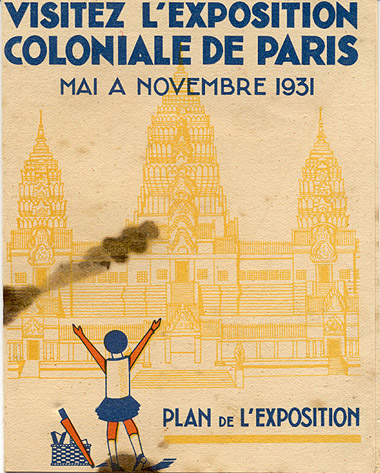
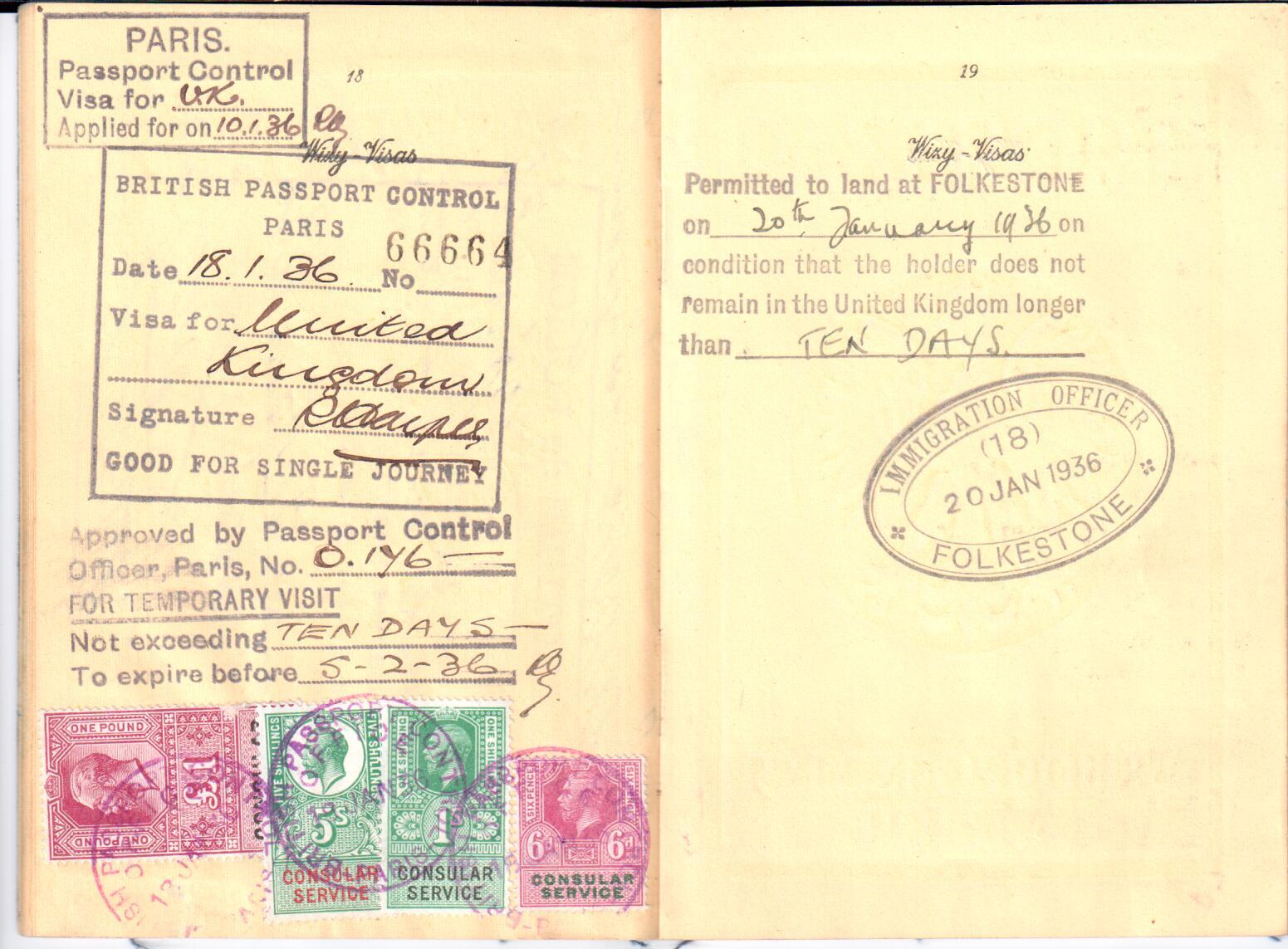
.jpg)
